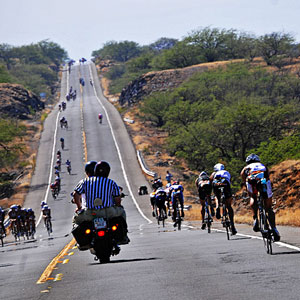Ironman’s burden

Ironman is a "for-profit enterprise" and I've been reminded of this by several officials attached to the federation system over the years, such reminder accompanied by finger-wagging because sport at the highest level is supposed to be pure, and governing bodies and anti-doping agencies never (perish the thought) have the profit motive in mind.
But because of Ironman's status as a—get ready for the insult—business, federations often consider Ironman a worthy entity from which to extract money, but unworthy of the provision of the services these federations provide.
One such service is drug testing. The Hawaiian Ironman is as much a triathlon world championship as anything the ITU puts on, and the Court of Arbitration for Sport has written as much in a consent decree. Nevertheless, the joke for years in the pro ranks has been that Michael Lovato is the token American Ironman athlete in the out-of-competition testing pool.
Not only are Ironman athletes forgotten whenever USA Triathlon and USADA get together to decide who'll be monitored for PEDs, USAT's testing at domestic Ironman events—a pledge that helped bring WTC back into the federation system just a handful of years ago—has been forgotten.
Meanwhile, triathletes, bike shops, running stores, that exist in Wisconsin, Upstate New York, Utah, Arizona, Western Canada, and elsewhere can attest to the effect an Ironman has in their areas. This is not only specific to what happens on Ironman day in their states, but in the short course series of races that spring up like an annual bloom when rain falls. The effect on the multisport economy that Ironman brings is incalculable.
The effect Ironman has on USA Triathlon's purse also defies calculation, at least among those at USAT whose job it is to calculate.
USAT is not alone in misunderstanding the degree to which it has Ironman to thank for its largesse. Most other federations are likewise complicit in taking Ironman's money and returning next to none of it back. Germany and Australia appear exceptions and, oddly enough, provide some cover for USAT: Ironman is unlikely to again bolt the federation system as long as enough offshore national federations chip in on drug testing.
Will USAT lift a finger to help fund drug testing at WTC's events? It may. But it hasn't yet.
USADA has clearly indicated it won't pitch in. Is it sour grapes, because WTC chose the worldwide anti-doping body ANADO to administer its drug testing program instead of (the not-profit-motivated) USADA? I don't know. The fact remains, USADA will be testing almost no Ironman athletes, and at almost no Ironman races unless Ironman pays it to do so.
This is where the new Ironman Pro Membership Program comes in. Pros will pay an annual $750 for the privilege of racing at an Ironman or 70.3, and I'm sure most pro triathletes think this is a way for Ironman to get into their pants pockets and extract just that much more money. They're half right.
Yes, Ironman has its hand in a pocket, but it's not in the pocket of the pro; rather this money is coming out of the pants pockets of race directors. Most Ironman pros have had to pay all, or at least some, of their IM or 70.3 entry fees in recent years. If a pro races two Ironman events and two 70.3 events, that $750 is going to feel like a bargain. The only additional fee the pro will pay is for entry to Kona or Clearwater.
It's the Ironman licensee who's getting pinched. The RD who puts on Ironman races in Brazil, Austria, South Africa, Australia, and elsewhere; the 70.3 licensee who puts on any of the roughly 40 events Ironman doesn't own; won't be able to get that pro entry money. But they'll still be obliged to pay out the pro prize purse.
Except they won't have to pay pros who fall outside 8 percent of the winner's time and, if you want to know where this new rule arose, look to the licensees (according to those I spoke with). This appears the gift given back to them to help assuage the lack of entry dollars.
Ironman's argument: The licensees should be happy, because they now get a drug testing program Ironman is underwriting to the tune of about a third of a million dollars a year.
The licensee's argument: Thanks but no thanks; the last thing we want is a positive drug test at our event. Not all licensees are this shortsighted. But Ironman is taking the long view on behalf of the licensees that just can't see past the immediate horizon.
What may yet happen is that national federations and anti-doping agencies around the world will see what a friend they have in Ironman, and money will spring forth to help Ironman fund its drug-testing program. If this happens, Ironman must decide what to do with the money it's raising from its pro athletes. I reckon this to be in the neighborhood of $750,000 annually, and of course this is my own, rough, estimate. Half of this will come from the $750 per roughly 500 worldwide pro payers. That's the obvious half.
The less obvious half will come from the new Ironman race. "What new Ironman race?" you might ask. The other part of the Ironman Pro Membership Program includes paring down the field at Kona and Clearwater, in an "… effort to maintain a quality professional field at the World Championship events." If Kona consists of 100 pros on its start line instead of 160, those 60 slots on an already crowded pier will be filled with age-groupers, 2500 of whom will gladly and eagerly fight over these newly available slots at St. George, Utah, or some other domestic Ironman to be determined.
I don't blame Ironman a bit; I would do the same thing. Of course I, like Ironman, am an evil merchant.
Nevertheless, if this money is going toward drug testing, what happens if the money is provided by the world's anti-doping agencies that finally "get it" about the value Ironman provides them? Or, if Amgen—the EPO maker that has been appropriately sponsoring a large cycling event—has a come-to-Jesus moment about its obligation to our sport, and underwrites Ironman's drug testing program?
If something like this happens, I have it on good authority Ironman will put the now-redundant money into the prize purse. According to my math adding $15,000 to the pro purse at every Ironman race worldwide, and $10,000 to every 70.3, ought to just about do it.
If the prize purses don't go up, that's a good indication most of the world's federations are happy cashing Ironman's checks and providing little in return.



